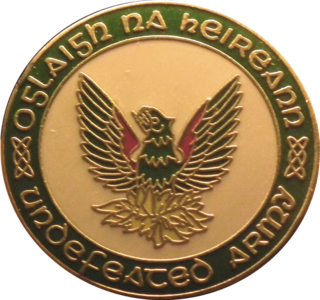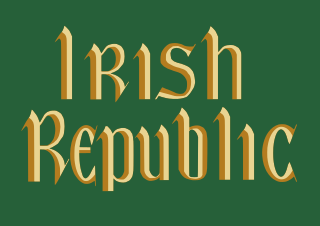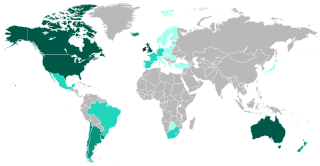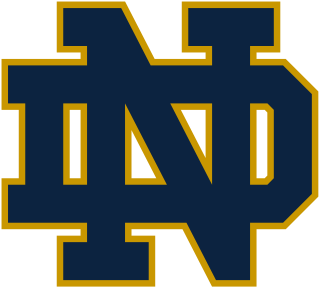
Belfast is the capital and largest city of Northern Ireland, standing on the banks of the River Lagan on the east coast. It is the 12th-largest city in the United Kingdom and the second-largest in Ireland. It had a population of 345,418 in 2021.

Dublin is the capital and largest city of Ireland. Situated on a bay on the east coast, at the mouth of the River Liffey, it is in the province of Leinster and the Eastern and Midland Region. It is bordered on the south by the Dublin Mountains, a part of the Wicklow Mountains range. At the 2016 census, it had an urban area population of 1,173,179, while the population of the traditional County Dublin as a whole was 1,347,359. The population of the Greater Dublin Area was 1,904,806.

Ireland, also known as the Republic of Ireland, is a country in north-western Europe consisting of 26 of the 32 counties of the island of Ireland. The capital and largest city is Dublin, on the eastern side of the island. Around 40% of the country's population of 5 million people resides in the Greater Dublin Area. The sovereign state shares its only land border with Northern Ireland, which is part of the United Kingdom. It is otherwise surrounded by the Atlantic Ocean, with the Celtic Sea to the south, St George's Channel to the south-east, and the Irish Sea to the east. It is a unitary, parliamentary republic. The legislature, the Oireachtas, consists of a lower house, Dáil Éireann; an upper house, Seanad Éireann; and an elected President who serves as the largely ceremonial head of state, but with some important powers and duties. The head of government is the Taoiseach, who is elected by the Dáil and appointed by the President; the Taoiseach in turn appoints other government ministers.

The Great Famine, also known as the Great Hunger, the Famine or the Irish Potato Famine was a period of mass starvation and disease in Ireland from 1845 to 1849, which constituted a historical social crisis which had a major impact on Irish society and history as a whole. With the most severely affected areas in the west and south of Ireland, where the Irish language was dominant, the period was contemporaneously known in Irish as an Drochshaol, loosely translated as "the hard times". The worst year of the period was 1847, known as "Black '47". During the Great Hunger, roughly a million people died and more than a million fled the country, causing the country's population to fall by 20–25%, in some towns falling as much as 67% between 1841 and 1871. Between 1845 and 1855, no fewer than 2.1 million people left Ireland, primarily on packet ships but also steamboats and barque—one of the greatest exoduses from a single island in history.

Northern Ireland is a part of the United Kingdom that is variously described as a country, province or region. Located in the northeast of the island of Ireland, Northern Ireland shares a border to the south and west with the Republic of Ireland. In 2021, its population was 1,903,100, making up about 27% of Ireland's population and about 3% of the UK's population. The Northern Ireland Assembly, established by the Northern Ireland Act 1998, holds responsibility for a range of devolved policy matters, while other areas are reserved for the UK Government. Northern Ireland cooperates with the Republic of Ireland in several areas.

Oliver Cromwell was a member of the landed gentry from Cambridgeshire who is widely regarded as one of the most important statesmen in English history. He came to prominence during the 1639 to 1651 Wars of the Three Kingdoms, first as a senior commander in the Parliamentarian army and then as a politician. A leading advocate of the Execution of Charles I in January 1649, which led to the establishment of the Commonwealth of England, he ruled as Lord Protector from December 1653 until his death in September 1658. He was selected 10th in a 2002 BBC poll of the 100 Greatest Britons, but his use of the military to acquire political power and the brutality of his 1649 Irish campaign means he remains a deeply controversial figure in both Britain and Ireland.

The Irish Republican Army, also known as the Provisional Irish Republican Army, and informally as the Provos, was an Irish republican paramilitary organisation that sought to end British rule in Northern Ireland, facilitate Irish reunification and bring about an independent, socialist republic encompassing all of Ireland. It was the most active republican paramilitary group during the Troubles. It saw itself as the army of the all-island Irish Republic and as the sole legitimate successor to the original IRA from the Irish War of Independence. It was designated a terrorist organisation in the United Kingdom and an unlawful organisation in the Republic of Ireland, both of whose authority it rejected.

Sinn Féin is an Irish republican and democratic socialist political party active throughout both the Republic of Ireland and Northern Ireland.

The Troubles were an ethno-nationalist conflict in Northern Ireland that lasted about 30 years from the late 1960s to 1998. Also known internationally as the Northern Ireland conflict, it is sometimes described as an "irregular war" or "low-level war". The conflict began in the late 1960s and is usually deemed to have ended with the Good Friday Agreement of 1998. Although the Troubles mostly took place in Northern Ireland, at times violence spilled over into parts of the Republic of Ireland, England and mainland Europe.

The United Kingdom of Great Britain and Northern Ireland, commonly known as the United Kingdom (UK) or Britain, is a sovereign country in Europe, off the north-western coast of the continental mainland. It comprises England, Wales, Scotland, and Northern Ireland. The United Kingdom includes the island of Great Britain, the north-eastern part of the island of Ireland, and many smaller islands within the British Isles. Northern Ireland shares a land border with the Republic of Ireland; otherwise, the United Kingdom is surrounded by the Atlantic Ocean, the North Sea, the English Channel, the Celtic Sea and the Irish Sea. The total area of the United Kingdom is 242,495 square kilometres (93,628 sq mi), with an estimated 2020 population of more than 67 million people.

Ireland is an island in the North Atlantic Ocean, in north-western Europe. It is separated from Great Britain to its east by the North Channel, the Irish Sea, and St George's Channel. Ireland is the second-largest island of the British Isles, the third-largest in Europe, and the twentieth-largest on Earth.

The United Kingdom of Great Britain and Ireland was a sovereign state in the British Isles that existed between 1801 and 1922, when it included all of Ireland. It was established by the Acts of Union 1800, which merged the Kingdom of Great Britain and the Kingdom of Ireland into a unified state. The establishment of the Irish Free State in 1922 led to the remainder later being renamed the United Kingdom of Great Britain and Northern Ireland in 1927.

The Irish War of Independence or Anglo-Irish War was a guerrilla war fought in Ireland from 1919 to 1921 between the Irish Republican Army and British forces: the British Army, along with the quasi-military Royal Irish Constabulary (RIC) and its paramilitary forces the Auxiliaries and Ulster Special Constabulary (USC). It was part of the Irish revolutionary period.

The Irish are an ethnic group and nation native to the island of Ireland, who share a common history and culture. There have been humans in Ireland for about 33,000 years, and it has been continually inhabited for more than 10,000 years. For most of Ireland's recorded history, the Irish have been primarily a Gaelic people. From the 9th century, small numbers of Vikings settled in Ireland, becoming the Norse-Gaels. Anglo-Normans also conquered parts of Ireland in the 12th century, while England's 16th/17th-century conquest and colonisation of Ireland brought many English and Lowland Scots to parts of the island, especially the north. Today, Ireland is made up of the Republic of Ireland and Northern Ireland. The people of Northern Ireland hold various national identities including British, Irish, Northern Irish or some combination thereof.

The Notre Dame Fighting Irish football team is the intercollegiate football team representing the University of Notre Dame in Notre Dame, Indiana, north of the city of South Bend, Indiana. The team plays its home games at the campus' Notre Dame Stadium, which has a capacity of 77,622. Notre Dame is one of seven schools that competes as an Independent at the National Collegiate Athletic Association (NCAA) Football Bowl Subdivision (FBS) level; however, they play five games a year against opponents from the Atlantic Coast Conference (ACC), of which Notre Dame is a member in all other sports except ice hockey. In response to the COVID-19 pandemic, Notre Dame football competed as an ACC member for the 2020 FBS season. During the 2020 season, they went on to appear in the ACC Championship Game.

The Irish Republican Army (IRA) is a name used by various paramilitary organisations in Ireland throughout the 20th and 21st centuries. Organisations by this name have been dedicated to irredentism through Irish republicanism, the belief that all of Ireland should be an independent republic free from British rule.

The United Kingdom of Great Britain and Northern Ireland (UK), since 1922, comprises four constituent countries: England, Scotland, and Wales, as well as Northern Ireland. The UK Prime Minister's website has used the phrase "countries within a country" to describe the United Kingdom. Some statistical summaries, such as those for the twelve NUTS 1 regions of the United Kingdom, refer to Northern Ireland, Scotland, and Wales as "regions". With regard to Northern Ireland, Scotland and Wales particularly, the descriptive name one uses "can be controversial, with the choice often revealing one's political preferences".

Irish, also known as Gaelic, is a Goidelic language of the Insular Celtic branch of the Celtic language family, which is a part of the Indo-European language family. Irish is indigenous to the island of Ireland and was the population's first language until the 19th century, when English gradually became dominant, particularly in the last decades of the century. Irish is still spoken as a first language in a small number of areas of certain counties such as Cork, Donegal, Galway, and Kerry, as well as smaller areas of counties Mayo, Meath, and Waterford. It is also spoken by a larger group of habitual but non-traditional speakers, mostly in urban areas where the majority are second-language speakers. Daily users in Ireland outside the education system number around 73,000 (1.5%), and the total number of persons who claimed they could speak Irish in April 2016 was 1,761,420, representing 39.8% of respondents.

Raidió Teilifís Éireann (RTÉ) is the national broadcaster of Ireland headquartered in Donnybrook, Dublin. It both produces and broadcasts programmes on television, radio and online. The radio service began on 1 January 1926, while regular television broadcasts began on 31 December 1961, making it one of the oldest continuously operating public service broadcasters in the world. RTÉ also publishes a weekly listings and lifestyle magazine, the RTÉ Guide.
















